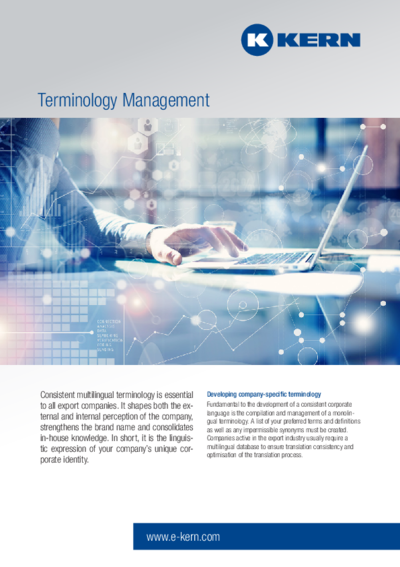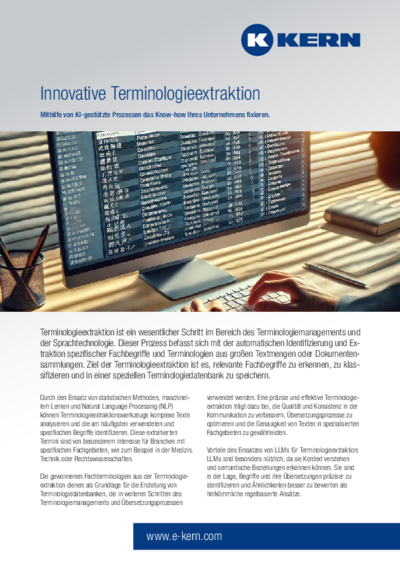
Terminology management for your translation processes
Specialist terms must be translated consistently in all foreign languages. Usually, translators can only translate company-specific terms in cooperation with the customer. Active terminology management with products, specialist terms and innovations is an important component of the translation process.
Through the use of sophisticated translation memory systems as well as terminology databases (both existing ones and those developed in collaboration with you), KERN UK Ltd. can guarantee an optimised translation process, maximum consistency of the terminology used and improved quality assurance.
What is terminology management?
Terminology management is an important process in the language industry that aims to systematically manage specialised terminology in a company or project. It includes the creation, maintenance and organisation of terminology databases to ensure that specific terms and expressions are used consistently in all linguistic communication materials.
The main objective of terminology management is to enable clear and consistent communication, both internally and externally. By creating a reliable terminology basis, all employees, translators and editors can access standardised terms and definitions. This minimises the risk of misunderstandings and ensures that the intended meaning is conveyed consistently in all languages.

Terminology management plays a crucial role in the translation process. By accessing the predefined terminology databases, translators can use the correct technical terms, resulting in higher quality and accuracy of translations. In this way, the translation process becomes more efficient and the terminology used within the translations stays consistent.
Terminology management is particularly important in industries with specific technical terms, such as the technical, medical or legal sectors. Consistent use of the correct terminology in these areas is crucial to ensure comprehensibility and accuracy of communication.
-

Translation memory systems
Learn more
-

term4client™
Learn more
Infosheet Terminology management
A uniform company terminology for all languages is essential for an exporting company. It shapes both the external and internal perception of the company, strengthens the company brand and consolidates in-house knowledge. Put simply: it is the linguistic expression of your company's unique corporate identity.
Enquiries & advice
You are interested in terminology management? You can reach us by phone at 0800 5376 5376, by email at info@e-kern.com or via our contact form.
We are happy to help

We are there for you Monday to Friday from 8:00 AM to 6:00 PM.
Email: info@e-kern.com
What is terminology extraction?
Terminology extraction is an essential step in the field of terminology management and language technology. This process deals with the automatic identification and extraction of specific technical terms and terminology from large volumes of text or document collections. The aim of terminology extraction is to recognise and classify relevant technical terms and store them in a special terminology database.
By using statistical methods, machine learning and Natural Language Processing (NLP), terminology extraction tools can analyse complex texts and identify the most frequently used and specific terms. These extracted terms are of particular interest for industries with specific specialisations, such as medicine, technology or law.
The specialised terminologies obtained from terminology extraction serve as the basis for the creation of terminology databases, which are used in further steps of terminology management and translation processes. Precise and effective terminology extraction helps to improve the quality and consistency of communication, optimise translation processes and ensure the accuracy of texts in specialised fields.

Benefits of using LLMs for terminology extraction: LLMs are particularly useful as they can understand context and recognise semantic relationships. They are able to identify terms and their translations more precisely and evaluate similarities better than conventional rule-based approaches.
What does KERN UK Ltd. offer in the field of terminology extraction?
KERN UK Ltd. offers support with terminology extraction or with securing company expertise thanks to our many years of experience in terminology management and technical extraction methods. Extracting company-related specialised terms and concepts offers the possibility to maintain and define internal language use consistency.

With the help of extraction tools, terminology extraction can be carried out by a native-speaker translator or terminologist in a complex process. The extraction takes place on the basis of the source text and respective translation, but can also be done from a previous translation project. The extraction tools generate a list of terminology candidates, which are then selected by your personal project manager and agreed with you.
How can the terminology extraction process be described?
The terminology extraction and validation process comprises several steps, which are carried out both automatically and manually. This ensures that the extracted terms are precise and application-orientated:
1. Bilingual term extraction:
- Input of a bilingual file (XLIFF, TMX, XLSX, CSV).
- Analysis of texts in the source and target language using an LLM that understands the context and recognises relevant terms.
- Application of the extraction parameters (see below).
- Output of a structured table or termbase.
2. Manual validation by a terminologist:
- Review of term candidates.
- Supplementation or adaptation of the terms to make them more precise or specific.
- Categorisation and tagging in preparation for later integration of the termbase into other systems and applications.
- Creation of definitions and context examples.
3. Customisation of the termbase for specific application purposes, such as:
- Corporate wording for a CMS.
- Glossaries for machine translation engines.
- Terminology database for a translation management system (TMS) or editing system.
- Keywords for Search Engine Optimisation (SEO).
What are the parameters used for extraction?
Extraction is based on the following parameters:
- Source Language: The language from which the terms are to be extracted.
- Target Language: The language into which the terms are translated.
- Maximum Term Length: The maximum length of the terms, i.e. how many words a term may contain (e.g. a term with a maximum of 3 words).
- Similarity: This indicates the similarity of the terms between the source and target language. It is based on a percentage match. The higher the value, the more similar the terms are in both languages.
Which input and output formats are possible for term extraction?
Input formats: Term extraction supports various bilingual file formats for processing multilingual content. These include the XML-based XLIFF format, which was specially developed for translation processes, and TMX for the exchange of translation memories. Tabular formats such as XLSX and CSV can also be used to process terms and their translations.
Output formats: The extracted terms can be exported in various formats: as an Excel spreadsheet (XLSX) or CSV file, which contains a detailed list of all terms found. The TBX format, which was specially developed for terminology databases, is available for professional terminology management.
What structure does the Excel output follow?
The Excel output of the terminology extraction provides a clear structure that allows the extracted terms to be analysed in detail. Important information about each term is recorded in columns: For example, you will find the term in the source and target language, the segment from which it was extracted, as well as its tags and ranking according to the specified extraction parameters. Finally, the last column indicates the frequency of the term and helps to clearly identify relevant terms and integrate them efficiently into the existing terminology.
Innovative terminology extraction with the help of AI-supported processes
Terminology extraction with Python and LLMs provides an automated, contextualised method for the efficient identification and translation of multilingual terms. The process can be customised with flexible parameters such as “Similarity” and “Maximum Term Length”. Combined with terminology expertise, this results in an accurate termbase that is manually checked to ensure the correct terminology is used. Structured output in Excel or TBX format and customisation to specific requirements (CMS, TMS, SEO) enable seamless integration into existing workflows and various systems. KERN UK Ltd. guarantees the highest translation quality thanks to its experienced specialist translators and state-of-the-art AI-supported technology.

Innovative Terminologieextraktion
Terminologieextraktion ist ein wesentlicher Schritt im Bereich des Terminologiemanagements und der Sprachtechnologie. Dieser Prozess befasst sich mit der automatischen Identifizierung und Extraktion spezifischer Fachbegriffe und Terminologien.


Language Courses